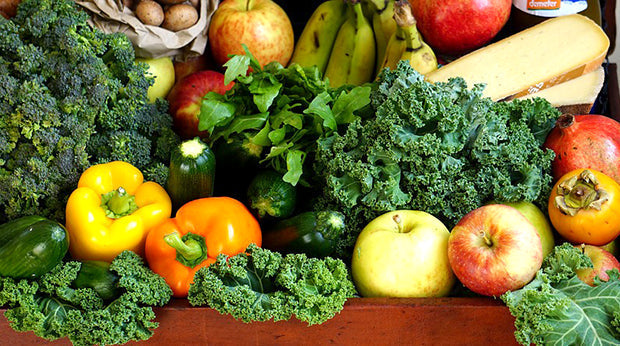Vegetarianism: positive impact on the environment
All around us, people are becoming more aware of climate change.
In addition to a collective awareness of the environmental crisis, vegetarian and vegan diets are growing in popularity. Plant-based diets offer solutions and have a positive impact on the environment.
Vegetarianism: the current situation
For a long time, vegetarianism was seen as a trendy, even ironic, miracle diet reserved for marginal communities. However, interest in vegan lifestyle and vegetarian food seems to have taken root among us.
According to a study by researchers at Dalhousie University, 10% of Canadians now identify themselves as vegetarian or vegan. In parallel with this movement, Canadian statistics show a marked decrease in the consumption of beef, pork and dairy products.
However, the Canadian reality is far from the global picture. Between 1961 and 2011, meat consumption rose by 86% worldwide. This increase is mainly due to a growing wealthier population. As meat is an expensive food, economic growth has made meat and dairy products more accessible.
However, this increase is not without consequences for the environment.
Vegetarianism: to combat greenhouse gas emissions
Greenhouse gases (GHGs) are the gases responsible for global warming. Increasingly present in the earth's atmosphere, they are contributing to the current environmental crisis.
A few years ago, a branch of the United Nations (UN) published a report showing that raising animals for human consumption is one of the sectors most responsible for greenhouse gas emissions. According to the report, the livestock and dairy industries produce 18% of all greenhouse gases, 9% of all carbon dioxide and 37% of methane (an atmospheric gas with a warming power at least 25 times greater than CO2). Some independent organizations have published even higher figures.
Despite these statements, global meat consumption continues to rise. Current forecasts indicate that it will double by 2050, further contributing to and accelerating climate change.
However, adopting a vegan, vegetarian or pesco-vegetarian diet (vegetarianism with fish consumption) could cancel out the increase in greenhouse gas accumulation predicted between now and 2050.
This is due to the low environmental impact of plant-based diets. According to an article published in one of the world's oldest and most prestigious medical journals The Lancetplant-based diets could reduce the environmental impact of the agricultural system by 84%, meeting a pressing need for sustainability.
Vegetarianism: conserving our forests
In order to raise animals on a large scale, we first need to feed them. This creates a major deforestation issue. At present, tropical forests are being ravaged to free up space for the monoculture of grain for captive animals. Intensive livestock farming and its implications are at the root of deforestation in the Amazon.
With global meat consumption set to double by 2050, the consequences for deforestation will be disastrous.
However, if the world adopted vegetarianism or veganism, land use would be reduced by 3.1 million hectares, or 76%.
Vegetarianism: preserving watercourses
In addition to preserving forests and green spaces, plant food helps to keep waterways healthy.
The livestock industry is the main source of water pollution in both developed and emerging countries. This finding of the UN report has been repeatedly confirmed by numerous organizations. Meat production is a major source of nitrogen, phosphorus and other environmental pollutants, which seep into watercourses, affecting their balance and biodiversity.
As well as contributing to water contamination, the meat industry is responsible for the depletion of freshwater sources. Meat and dairy products require more water resources than plants. By way of comparison, growing vegetables requires 322 liters of water per kilogram of vegetable, whereas beef requires over 15,000 liters for the same weight.
With Earth Day just around the corner, it goes without saying that we need to be aware of our eating habits and their impact on our environment. Going vegan isn't always easy, but cutting back on meat or following the new recommendations in Canada's Food Guide for the Mediterranean diet can go a long way towards reducing greenhouse gas emissions.
Fortunately, the plant-based food industry is booming, and it's never been easier to replace meat with plant-based alternatives. Drop in and see for yourself.
We wish you good health!
About the author
Naturopaths of La Boite à Grains
Team of licensed and certified naturopaths (ND) in Gatineau, Outaouais.
Original article written by Véronique Cousineau, Naturopath
Sources
- Dr Martin Juneau, M.D., FRCP. Eat less meat to preserve the planet. July 11, 2017. Prevention observatory. Montreal Heart Institute. Accessed April 8, 2019
- Meat consumption, health, and the environment. H. Charles J. Godfray, Paul Aveyard, Tara Garnett, Jim W. Hall, et al. Science Journal. 20 Jul 2018
- Reducing food's environmental impacts through producers and consumers. J. Poore, T. Nemecek. Science Journal. 01 Jun 2018.
- Importance of considering environmental sustainability in dietary guidelines. Hanna L Tuomisto. The Lancet | Planetary Health. Volume 2, ISSUE 8, August 01, 2018.
- THE GREEN, BLUE AND GREY WATER FOOTPRINT OF FARM ANIMALS AND ANIMAL PRODUCTS. M.M. Mekonnen A.Y. Hoekstra. Institute for water education, UNESCO. December 2010.



1 comment
J’habite en France , et suis végétarienne depuis onze ans ainsi que mon mari et les enfants (j’ai une fille vegan). Je vous remercie de publier cet article clair et simple qui a le mérite d’être suffisamment didactique pour que tout le monde se rende compte du bien-fondé de votre exposé. Peut-être pourriez-vous évoquer aussi la cruauté que nous faisons éprouver à toutes ces pauvres bêtes d’élevage. Bien souvent les gens chouchoutent leur petit chien ou chat tout en mangeant allègrement du veau ou de l’agneau.
Cordialement